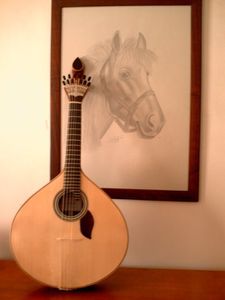The Origins of FADO, as a form of Musical Expression

Par Jose Lucio
If you had read more than 60 books on this elusive subject, you will surely be aware that I am going to speak of a controversial subject. If you study the material, there are bound to be some points on which we disagree.
But when investigating a subject we form our own opinion on the material studied.
I do not stick to the pure facts, but am against the inflexibility of unfounded ideologies.
To speak of FADO one must read and reread a variety of opinions, masticate them well, go over and over them... say something and then… let things happen. Whatever the origin of FADO may have been, for me the most credible opinion is that of Alberto Pimentel.
In his book "Triste Canção do Sul" ("Sad Song of the South") he is very clear in his analysis.
Luis de Camões, in his epic poem "Os Lusiadas" uses the word fado 18 times.
This is precisely where the less observant reader begins to have mistaken ideas on the origin of FADO.
The word fado is one thing and FADO, as a form of musical expression, is another.
A study of Portuguese literature in the XVI, XVII and XVIII centuries by Alberto Pimentel corroborates this statement. Tinop is not of the same opinion; FADO has a maritime air about it.
This is unlikely. Portugal being a country of such great maritime expansion, FADO would have appeared in various parts of Portugal, have been introduced by sailors and be reported in the archives and ships records, for example in Ponta de Sagres, where the Naval School was.
Another unfounded opinion is to envisage similarities between FADO and Lundum, an African umbilicus dance.
If this were the case, once again it would have been taken to other places and would not have remained just around the Lisbon area.
To establish a direct link between FADO with the yearning of the Moors, with the Argentine Tango, with the S. João de Braga Festivities or with the loneliness of a sailor on the high seas, would imply that the same had been present in the beat of other peoples of cultures other than the Portuguese.
That the Portuguese may now savour FADO in various parts of our territory does not make FADO the national song.
Each region of Portugal has its own very distinct way of singing and feeling it. Returning to Alberto Pimentel’s ideas, first man was born and then musical expression.
That is to say, first the fado singer was born and then FADO itself. But the first fadista (fado singer) did not sing. He was commissioned to compose fado for many people, as he was skilful in managing the navalha.
This celebrity appears quite logically as instable as the country, at the time the royal family fled to Brazil. Napoleon Bonaparte proclaimed the Continental Blockade and Portugal was invaded and sacked by the Napoleonic troops.
The badly lit streets and the abandoned houses of wealthy people, whet the appetite of foreigners. A plundered country is hungry, and in a house with no bread all are reproachful and no one is right.
Revenge and the settling of accounts caused this character to appear in our country, with long locks of dishevelled hair covering his face, the judge of all discord.
The fadista or fado singer was feared by one and all, boasting in the ill lit taverns, of his heroic deeds. It is quite probable that on his visits to the homes of wealthy people, who accompanied the flight of the Royal family to Brazil, he discovered the Portuguese Guitar and in its company began to sing of their feats.
The Portuguese Guitar whose first followers were in Oporto, originates from an English instrument called Cistre (not to be confused with Sistrum, three forked wooden instrument with metal disc – of the Chincalhos family), which was brought in through the Douro Barra where the boats of those who traded with the English merchants were moored.
The Oporto Chapel Master, António da Silva Leite, due to the increasing enthusiasm for this instrument, nationalised it and wrote a study on the Guitar, dedicated to Dona Antónia Magdalena and put it up for sale for 1,200 reis, on March 15th, 1796.
The music proposed for this study was Minuets, Marches, Allegros and Quadrilles. In this study on the Guitar no reference is made to any musical expression related to FADO.
If it did exist at the time, it should also have been considered by this music teacher. Only from this date on did the word Guitar enter the Portuguese vocabulary.
To stress the importance of another Method dated 1789, written by Paixão Ribeiro for 12 stringed, 5 freted, metal stringed Guitar "A Nobre Arte da Viola" (The Noble Art of the Guitar), Silva Leite’s Guitar only had 10 strings, the first 4 double strings and the rest singles (natural tuning was used – from high to low Soh, Me, Doh, Soh, Me, Doh).
Through the analysis of these documents it can be observed that the Guitar was born without being acquainted with fado.



/idata%2F4379630%2F6-10-2012-2.JPG)
/idata%2F4379630%2Foferta-frances.jpg)
/https%3A%2F%2Fassets.over-blog.com%2Ft%2Fcedistic%2Fcamera.png)